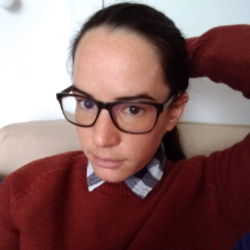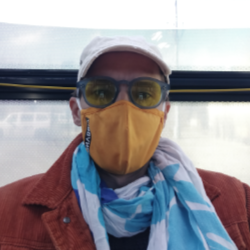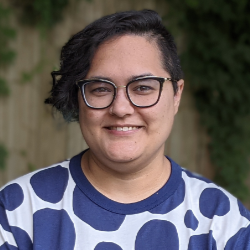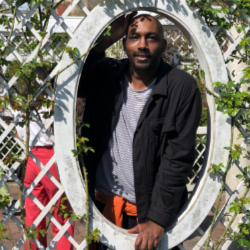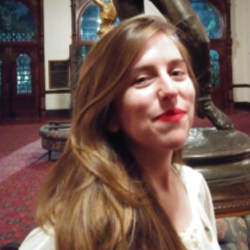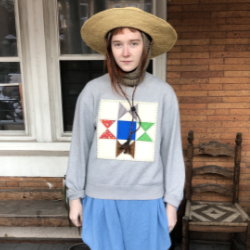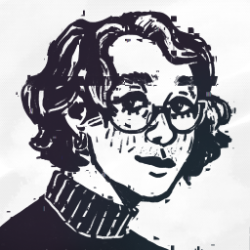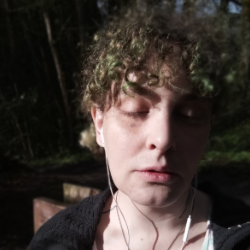Sara laid down on the ground in the middle of her rug. I am a rat, she said. I crawl on my belly. With this she scampered under the bed.
She stayed under the bed for a few hours until there was a knock at the door. Hello, said the person at the door. I am the ratmilk man! I am here to milk all of your rats so I can give you money for their milk and sell it to all of the people in the world who love the way my ratmilk tastes.
Sara became curious and frightened. Oh no, she thought. She could not answer the door as a rat because rats do not answer doors. But if she answered the door as Sara she would not be milked.
This is a difficult situation, she thought. Oh no.
It was then that Sara got an idea. She partially stood up but did not stand up fully and sort of hobbled over to the door, crooked as can be. Hello? she answered the door looking up at the ratmilk man.
Hello, said the ratmilk man. I notice you are somewhere between standing up like an adult woman and being on your belly like a rat. Might I ask which of the two you are?
I am an adult rat woman, said Sara. Who may need to be milked.
Ah, said the ratmilk man, suppressing a smile.
Sara invited the ratmilk man inside and he lived with her and her dog for some time. They drank the milk of rats in their coffee and put it in their cereal in the morning. In the evenings the ratmilk man would milk Sara. To him her milk was the most precious of all.
–
Sara and her dog were floating through space and came upon seven planets orbiting a star. They went to the first planet and it was covered in a thing that looked like moss. Sara touched it and it was slightly damp. It was furry, soft and white. She whispered secrets into it. One of the secrets was about a frog she had met. I will tell you the secret now. What Sara said was, That frog made me uncomfortable, but I thought about it and I understand now that it was my problem and not his. Still it bothers me and I am not sure what to do with it. That is why I am telling you, this moss that is new to me. Thank you for listening. I’m not sure what frog she was talking about.
The second secret Sara whispered was about the ratmilk man. She said she thought she was falling in love. The third secret Sara had was about trains. She said she thought she was falling in love with trains
–
[INTERVIEW BETWEEN SARA AND TRAINS]
Trains: CLACKCLACKCLACKCLACKCLACK *rumblerumblerumble*
Sara (yelling): I LOVE YOU!!
Trains: CHUGCHUGCHUGCHUGCLACKCLACKCLACK
Sara (still yelling): I LOVE YOU SO MUCH, SWEET BABY
Trains: CH-CH-CH-CH-CH-CH-CLANKCLANKCLANKCLANKCLANKCLANK *rumble*
–
Sara’s dog explored the moss planet like a big doggie boy. He sniffed around at some moss. He peed on a tall plant that we might have called a tree because of its size, though we might have called it something else because it did not look like a tree. It was like if someone had planted one end of a caterpillar in the ground and the caterpillar had grown leaves on the lower and upper parts of its body, but in the middle had just grown bare branches. Sara’s dog was not sure if all of the plants of this kind were like this or just the ones in this particular area. Sara’s dog began to think about time, to think about how if we zoomed out we might see that things have only been the way we are seeing them for the exact amount of time we see them, and how woefully incomplete our pictures of anything at all, even things we consider ourselves to be totally familiar with, are.
Sara’s dog had all these thoughts while Sara tried eating the moss. Yuck, she thought. Why did I do that? I could have made myself very sick. That was a terrible idea.
–
Sara went on to the second planet while her dog further explored the first one for some reason. She had asked him and he just stared at her. It was probably about the concept of time. He was always staring at her in a way that made her pretty sure he was getting mindfucked by the concept of time.
On the second planet there were many dogs. Sara was glad that her dog had not come to this planet because she was afraid that she would lose him here and not be able to find him. She petted a bunch of the dogs. One of them peed on her and she took this as a form of communication. To her, the pee was like saying hello. She said hello back rather than peeing on the dog, though usually she tries to engage with the customs of the places she goes. No one said hello back. They were dogs.
–
Sara drew up a map of the second planet. It was in her notebook. The map consisted of her writing the word dogs and then on the edges she drew ocean waves and sea-monsters, because that is traditionally what one does with parts of a map that are yet unexplored. She walked a little farther and there were waves and sea-monsters and she wasn’t sure how to fix the map. She talked to a sea-monster for a while. It said it liked her hair and she said thank you. She said she had cut it herself because she lived with her dog and a ratmilk man who did not own scissors. It said, Could you have loaned him the scissors you cut your own hair with? and Sara said, No I borrowed them. The sea-monster had another question but Sara had started wandering away looking at some weird button-like thing on the ground and wasn’t listening anymore. The sea-monster rolled its eyes and went back into the waves. The waves were the most intelligent life on the planet, but this is always true on every planet.
–
[INTERVIEW BETWEEN THE AUTHOR AND THE SEA MONSTER]
Author: I’m sorry I didn’t write more about you. You seem wonderful, but Sara just wasn’t really paying any attention.
Sea Monster: Oh, don’t worry about it. I’ve got better things to do than be in a book. Anyway, you already wrote a book about a sea monster.
Author: Oh gosh, did I? I guess I did, in a way. Thanks for being kind.
Sea Monster: Don’t even worry about it, sweetheart.
Author: Do you want to hang out?
Sea Monster: I’m sorry I don’t date people who don’t live on the same planet as me.
Author: Oh. I mean, I didn’t…
Sea Monster: Shhh it’s okay. It’s okay.
Author: …oh, thank you.
–
Sara’s dog finally arrived on the second planet. He landed in a part that didn’t have any dogs. He smelled other dogs though and got excited. Sara’s dog liked other dogs a lot. Some dogs don’t like other dogs and Sara’s dog had always thought that was sad. He thought that dogs should care about and support other dogs. Sure, just because you’re a dog doesn’t mean you are going to get along with or have anything in common with another creature just because it is a dog, but that doesn’t mean all dogs can’t be kind to each other and always assume the best. And sure, that should be a practice for every living creature, but something about seeing dogs hurt each other felt especially sad.
Sara’s dog didn’t have a name. Sara had asked him what his name was when they first met and Sara’s dog had just let out a series of particularly informational smells that said I am yours.
–
Sara finally ran into her dog in a part of the planet that was near the part with other dogs. She recognized him immediately but then was unsure for a second. It had been an extremely long time since Sara was unsure what her beautiful doggie looked like.
–
Sara and her dog went onto the third planet together. On this planet it was all weeds. Just a huge pile of weeds everywhere. Somebody’s garden is highly neglected, thought Sara.
–
Sara’s dog and Sara went on to the fourth planet. It was cold and covered in gas. It was an extremely large planet and if I were to show you the percentage of it that Sara and her dog saw, it would take more zeros after a decimal place than you would want to read. They saw an extremely tiny portion of this planet. It was impossible to breathe there so they didn’t stay very long. Sara’s dog was great at holding his breath, but Sara passed out while leaving the planet’s atmosphere. Sara’s dog nudged her back to the weedy planet with his snout and afterward his nose was very bruised and sore but Sara was ok. The weeds made oxygen that tumbled into her lungs like it was nothing at all. It was a big help to Sara, who was almost dead. She vomited on a weed. The vomit smelled like the gas atmosphere on that big big planet.
Sara announced that she used to be okay with space travel but that now she was kind of freaked out by it. She looked around at the weed-covered planet and decided to go with the flow and create a yard where its sole purpose was to grow weeds. She decided to try to live here because it had her favorite thing: oxygen.
–
Sara’s time on the weedy planet was shorter than she originally thought. She tried to build a house there, but it turns out building a house is extremely difficult and building a house on a planet you have never spent time on is guaranteed to be a wildly frustrating experience. She found a rock to use as a kind of a blade and managed to chop down something that looked like it might contain something like wood but it turns out inside it was just a sort of pudding that smelled like chemicals. When she finally found something that looked like wood and something that looked like a nail the nail started yelling out math and Sara dropped it on the ground.
–
[INTERVIEW BETWEEN SARA AND THE THING THAT LOOKED LIKE A NAIL]
Thing: F∆s cos θ = ∆E
Sara: Hello?
Thing: B = ρgVdisplaced
Thing: ∯B · dA = 0
–
Sara and her dog went back home, knowing that there were still three planets they had not explored. Sometimes it is better to leave things unexplored. Sara became increasingly concerned that her exploration was something that caused damage to the places she explored.
–
The ratmilk man waited at Sara and her dog’s house the whole time they were gone. They were gone for an extremely long time. The ratmilk man was unsure why he stayed. He started to wonder about his life choices. What brought him to this place? Shouldn’t he be out milking rats?
–
When Sara got home she was incredibly excited to see the ratmilk man. They kissed and he milked her all night long as she played ratgirl with him. She pushed her fingers into his mouth and said, Lick my rat fingers.
–
Sara grew distant from the ratmilk man over the months following their trip to the planets. Something in her had changed. She still loved the ratmilk man and he still loved her, but he couldn’t find her and she couldn’t seem to fully find her way back. She took her dog and went for a walk in the evenings and he asked if he could join her and she said she would prefer to walk just with her dog.
One of these days when she got back he was gone. He said in a note he went to explore the planets for himself. He left her a bottle of milk that he had milked from himself while pretending to be a rat. It had a note attached that said Drink this and think of me. I love you.
–
Sara met a cactus in a desert. The cactus told her that it had water inside. The sand beneath her feet said, Yes there is water inside that cactus. Sara wasn’t so sure and kept walking until the ground took a sharp turn underneath her as if it was going down a cliff, except gravity moved with it so she was still walking just fine. She didn’t even stumble.
She walked a ways farther and came upon a rocky cloud. She kissed each rock she found there on its forehead as she sang a wordless, gentle tune. The rocks all fell asleep. It was so warm.
Sara went from there on to a monster’s house. The monster who lived in the house was there with two other monsters. Their bodies were covered with shaggy fur of different colors. One of the monsters had black fur and weighed maybe 800 lbs and was 6 feet tall and said her name was Car Crash. One of the other monsters who called themself Spackle had brown fur with rainbow spots and was very small, maybe the size of Sara’s hand, and the other one’s fur looked brown but when you got close you saw that each hair was a completely unique bright colour from every other hair in the fur. It was maybe 9 feet tall and had a big black tongue and was named Jehu. They all greeted Sara and invited her to be their fourth for bridge. Sara’s partner was Car Crash and Sara could not stop staring at her eyes.
Car Crash was the high bidder every round and so Sara played the dummy, watching Car Crash win hand after hand while she sat doing nothing. It was really impressive. One time Car Crash lost and looked really sad and so Sara walked around the table and took Car Crash’s hand in her hand and stroked the back of it as she looked in her eyes saying, You did so good. Thank you for being my bridge partner.
Jehu served them all coffee.
–
The ratmilk man returned from space and it was, for a time, like the beginning of old things again. He milked Sara and she showed him the places she had found rats and he showed her how to milk them. He showed Sara’s dog a rat and Sara’s dog tried to eat it and he took the rat back and said No, no.
–
One day the ratmilk man came to Sara and said, I received a letter in the mail.
What did the letter say? asked Sara.
The letter was from an electric building in the north somewhere, said the ratmilk man. It said that if I do not journey to sheol then the small tigers under my skin will become larger and use their teeth to rip out of the places where they lay asleep in their small blisters in my skin. It said that I could soon end up with ripped holes in my skin and many hungry tigers.
Why did you put tigers there? asked Sara.
I don’t remember, frowned the ratmilk man. There was much about his past that was mysterious to Sara.
And so Sara and her dog said their teary goodbyes to the ratmilk man, who hiked his orange pack with gray straps up on his shoulder and walked off into the early evening light.
Afterward Sara realized he left the letter, but when she tried to read it, it felt as if cold metal was being inserted into the back of her throat. She coughed and tried again and it was as if bees were stinging her perineum. She burned the letter and used the ashes to write a series of single words on the wall.
Milkingless, she wrote.
Polymer, she wrote next. Arboretum. Guinevere.
Never Angeline North is the author of the books Sea-Witch (Inside the Castle, 2020), Careful Mountain (CCM, 2016), and Sara or the Existence of Fire (Horse Less Press, 2014), among others. She lives in Olympia, WA where she runs an edgy t-shirt company and is going to be in a gay shrek play this summer. You can find her online at never.horse.
